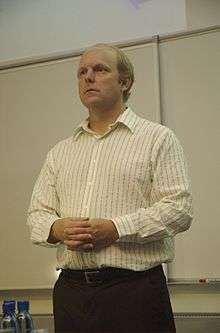Kent Beck
| Kent Beck | |
|---|---|
 | |
| Born | 1961 (age 56–57) |
| Citizenship | United States |
| Alma mater | University of Oregon |
| Known for | Extreme programming, Software design patterns, JUnit |
| Scientific career | |
| Fields | Software engineering |

Kent Beck (born 1961) is an American software engineer and the creator of extreme programming,[1] a software development methodology that eschews rigid formal specification for a collaborative and iterative design process. Beck was one of the 17 original signatories of the Agile Manifesto,[1] the founding document for agile software development. Extreme and Agile methods are closely associated with Test-Driven Development (TDD), of which Beck is perhaps the leading proponent.
Beck pioneered software design patterns, as well as the commercial application of Smalltalk. He wrote the SUnit unit testing framework for Smalltalk, which spawned the xUnit series of frameworks, notably JUnit for Java, which Beck wrote with Erich Gamma. Beck popularized CRC cards with Ward Cunningham, the inventor of the wiki.
He lives in San Francisco, California and worked at social media company Facebook.[2]
History
Beck attended the University of Oregon between 1979 and 1987, receiving B.S. and M.S. degrees in computer and information science.[3]
In 1996 Beck was hired to work on the Chrysler Comprehensive Compensation System. Beck in turn brought in Ron Jeffries. In March 1996 the development team estimated the system would be ready to go into production around one year later. In 1997 the development team adopted a way of working which is now formalized as extreme programming. The one-year delivery target was nearly achieved, with actual delivery being only a couple of months late.
Publications
Books
- 1996. Kent Beck's Guide to Better Smalltalk : A Sorted Collection. Cambridge University Press. ( ISBN 978-0521644372)
- 1997. Smalltalk Best Practice Patterns. Prentice Hall. ( ISBN 978-0134769042)
- 1999. Extreme Programming Explained: Embrace Change. Addison-Wesley. Winner of the Jolt Productivity Award. ( ISBN 978-0321278654)
- 2000. Planning Extreme Programming. With Martin Fowler. Addison-Wesley. ( ISBN 978-0201710915)
- 2002. Test-Driven Development: By Example. Addison-Wesley. Winner of the Jolt Productivity Award. (
ISBN 978-0321146533)
- Beck's concept of test-driven development centers on two basic rules:
- Never write a single line of code unless you have a failing automated test.
- Eliminate duplication.
- Beck's concept of test-driven development centers on two basic rules:
The book illustrates the use of unit testing as part of the methodology, including examples in Java and Python. One section includes using test-driven development to develop a unit testing framework.
- 2003. Contributing to Eclipse: Principles, Patterns, and Plugins. With Erich Gamma. Addison-Wesley. ( ISBN 978-0321205759)
- 2004. JUnit Pocket Guide. O'Reilly. ( ISBN 978-0596007430)
- 2004. Extreme Programming Explained: Embrace Change, 2nd Edition. With Cynthia Andres. Addison-Wesley. Completely rewritten. ( ISBN 978-0201616415)
- 2008. Implementation Patterns. Addison-Wesley. ( ISBN 978-0321413093)
Selected papers
- 1987. "Using Pattern Languages for Object-Oriented Programs". With Ward Cunningham. OOPSLA'87.
- 1989. "A Laboratory For Teaching Object-Oriented Thinking". With Ward Cunningham. OOPSLA'89.
- 1989. "Simple Smalltalk Testing: With Patterns". SUnit framework, origin of xUnit frameworks.
References
- 1 2 "Extreme Programming", Computerworld (online), 2005, webpage: Computerworld-appdev-92.
- ↑ "Where I worked (Facebook)..."
- ↑ Beck, Kent. "Kent Beck". LinkedIn. Retrieved March 5, 2012.
External links
| Wikimedia Commons has media related to Kent Beck. |
| Wikiquote has quotations related to: Kent Beck |